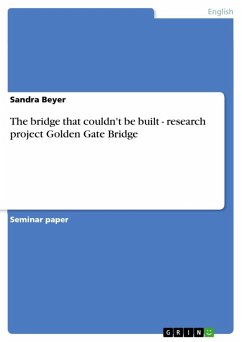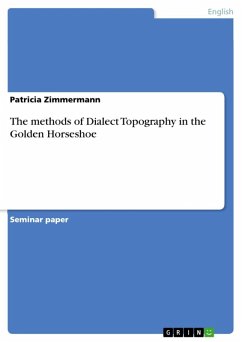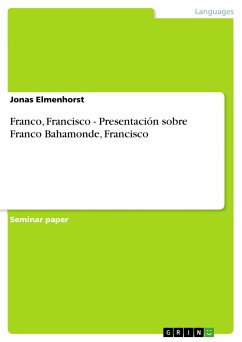
The bridge that couldn't be built - research project Golden Gate Bridge (eBook, ePUB)
Sofort per Download lieferbar
Statt: 15,95 €**
13,99 €
inkl. MwSt. und vom Verlag festgesetzt.
**Preis der gedruckten Ausgabe (Broschiertes Buch)
Alle Infos zum eBook verschenkenWeitere Ausgaben:

PAYBACK Punkte
0 °P sammeln!
Seminar paper from the year 2003 in the subject American Studies - Culture and Applied Geography, grade: 1 (A), San Francisco State University (Englsih Department), course: San Francisco, language: English, abstract: HISTORICAL BACKGROUND In the late 1800's traveling to San Francisco has not been easy. By sea the city was always readily accessible, from the south, land travelers could journey uninterrupted up the peninsula that separated the Pacific from the Bay. But travelers from the north and east did not have such ready access to the city. They could turn southward when they came to the wa...
Seminar paper from the year 2003 in the subject American Studies - Culture and Applied Geography, grade: 1 (A), San Francisco State University (Englsih Department), course: San Francisco, language: English, abstract: HISTORICAL BACKGROUND In the late 1800's traveling to San Francisco has not been easy. By sea the city was always readily accessible, from the south, land travelers could journey uninterrupted up the peninsula that separated the Pacific from the Bay. But travelers from the north and east did not have such ready access to the city. They could turn southward when they came to the water and make the arduous two-day journey around the Bay and up the peninsula, or they could seek conveyance by water across the unpredictable and sometimes treacherous tides of San Francisco Bay. There was a ferry service provided and the boats ran on a regular, planned basis and carried tens of thousands of people across the Bay to work in the morning and returning home in the evening. However, the ferries were quite slow and unpredictable. If the seas were high ferries might not sail or at least be terribly offschedule. The tricky Bay fogs sometimes made the journey frightening and dangerous. In heavy seas and high winds, the ferryboats sometimes pitched and tossed wildly, leaving the passengers ill and terrified. The need for a bridge over the Golden Gate was obvious and many people might have wondered at that time if the narrow passageway of sea between Lime and Ford points would be ever bridged.
Dieser Download kann aus rechtlichen Gründen nur mit Rechnungsadresse in A, B, BG, CY, CZ, D, DK, EW, E, FIN, F, GR, HR, H, IRL, I, LT, L, LR, M, NL, PL, P, R, S, SLO, SK ausgeliefert werden.













